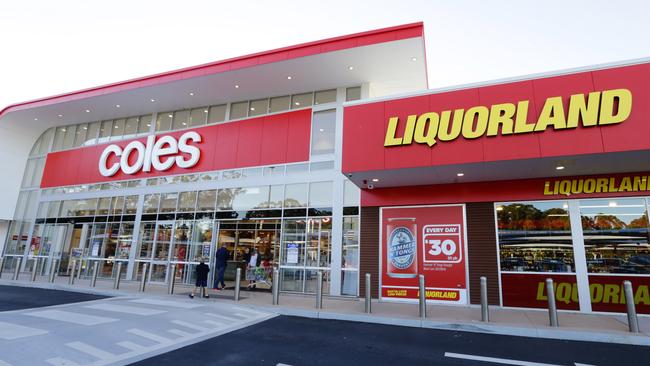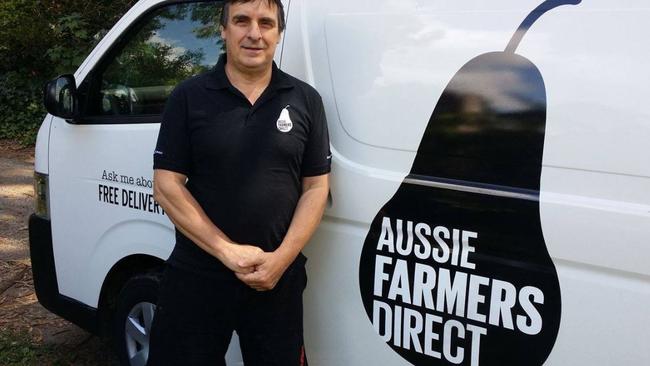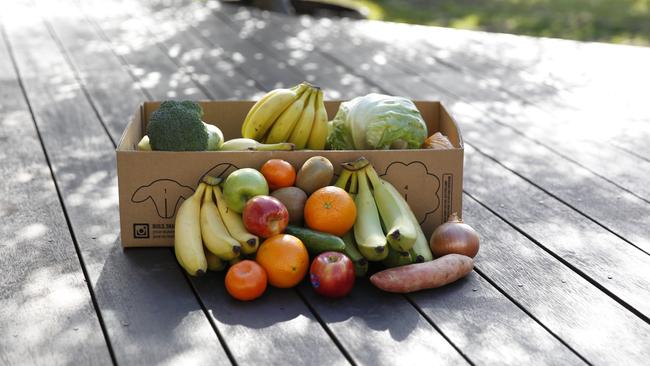Aussie Farmers Direct was quick to blame Coles and Woolworths for its demise — that wasn’t the whole story
AUSSIE Farmers Direct has blamed supermarkets Coles and Woolworths for its collapse. But franchisees say that’s a cop out.
FORMER franchisees and retail experts have questioned failed grocery delivery business Aussie Farmers Direct’s insistence that supermarket giants Coles and Woolworths were responsible for its downfall.
Rather, those on the inside have said the company’s over expansion, increasing pressure on franchisees and a tightening consumer wallet all put paid to the retailer which launched more than a decade ago promising fresh food and a fair deal to farmers.
One franchisee has told news.com.au he’s “bitter” his $100,000 plus investment in the Aussie Farmers Direct (AFD) brand has come to nought and he has questioned the ethics of shutting down just hours before they were due to pay suppliers.
On Monday, AFD announced it would be going into voluntary administration with all deliveries ceasing immediately. More than 100,000 customers and 260 staff were left in the lurch.

“We are simply no longer able to compete against the domination of the major two supermarkets and the influx of cheap imported produce,” the company said on their website.
But Geoff Roberts, 58, who ran an AFD franchise in Melbourne’s east, said the company became too focused on a quest for growth and swerved too far away from simple fresh food by introducing non perishables.
“They say they were killed by competition from Coles and Woolworths but I don’t think it was the whole story. Aussie Farmers were not happy with 5 per cent of the market, they wanted 30 per cent.
“They were trying to diversify too far rather than stick to what they were good at; people weren’t looking to buy cheap goods, they were looking to get the most ethically and sustainably produced good produced as locally as possible.”
His views are echoed by angry customers on AFD’s Facebook page. “They should have stuck to milk and fruit/vegies. I never got vegies that lasted the week after the first 12 months. To blame the big retailers is a disgrace, if the quality and cost was there, the customers would stay,” said one.
“Big supermarkets had nothing to do with (AFD’s) downfall. You aren’t a victim. You ran your company into the ground and now the franchisees and their employees are the ones suffering,” said another.

DEVASTATED
Mr Roberts, with his wife Heather, signed on as a franchisee with AFD in late 2015 with a patch centred on the suburb of Wantirna. He then expanded in 2016 by buying the neighbouring franchise. Purchasing the franchises and a van has set him back almost $130,000.
Unlike some franchisees who employed casual drivers, Mr Roberts would drive the boxes of produce around the neighbourhood himself. Starting around midnight four days a week, it would usually take until 7am to service the up to 300 customers in his patch.
“My customers are devastated. I’ve been getting messages and calls from people who have heard it’s gone under.”
Mr Roberts said he was seduced by slick marketing events at the AFD warehouse in Melbourne: “I thought, this is a great idea, providing a fair deal for farmers and going back to the idea of bringing back the milkman and delivering direct to customer.
“It was a chance for me to jump into something I liked the ethos of and then, as I retired, have a driver come in. Then I would have an income in my retirement but just do the managerial stuff,” he said.
At 11.26am on Monday that dream ended abruptly when an email quietly fell into his inbox from AFD informing him, and other franchisees, that the company had ceased operations.
“I was still asleep at the time as I’d only got back from delivering at 7am. I didn’t know anything until my accountant called to ask me if I’d seen the news,” Mr Roberts said.

EASY TO BLAME BIG TWO
Mr Roberts said the timing of the collapse could not have been worse given that Monday evening was when AFD was due to pay their franchisees. He estimates AFD owe him potentially as much as $7000 for the deliveries completed over the last month, let alone the lost income now his business has simply stopped.
“I feel bitter as they must have known something was coming (yet) they waited to say they couldn’t pay us. But I can’t say to Toyota ‘can you hold off on repayments for the van’.
“I’m trying to stay positive but I have to work out something quick to keep my creditors from taking the house. If you can’t pay your mortgage you lose your house, that’s how it works.”
Mr Roberts said in hindsight, it now seemed AFD were “in a hole” before they handed over the company to administrators.
Franchisees were urged to schedule more delivery slots and deliver day and night, he said. In recent months a number of franchisees had parted with the company.
Associate Professor Gary Mortimer, a retail expert at the Queensland University of Technology, told news.com.au AFD’s parting shot at Coles and Woolies masked deeper problems with the company’s model.
“It’s overly simplistic to blame the big two supermarkets. While prices did impact AFD, it was the entry of Aldi 15 years ago (before AFD set up) that has created a very price conscious consumer.”

LOYALTY ONLY WALLET DEEP
But there were other factors at play. AFD, which operated out of a central warehouse, had an expensive business model compared to the supermarkets which organised deliveries from stores located closer to customers.
In addition, specialising in perishable food was far riskier than shelf ready groceries like washing powders that don’t go off. While the myriad of costs on franchisees — from insurance to vehicles — ate away into already tight margins.
Consumers were also changing, Prof Mortimer said. Increasingly we’re buying tonight’s dinner on the way home from work and don’t want to wait for it to be delivered tomorrow..
And when it comes to eating ethically, we talk the talk but we don’t walk the walk: “Australians do want to support farmers and the little guy but loyalty is only as deep as your wallet. When the cost of living is going up, we soon start buying $2 milk again.”
Mr Roberts is at a loss what to do next, given AFD provided both the food to deliver and the payments and back end systems to administer his business. All he has been left with is an empty van.
“The main thing I’d like to do is keep supplying to our customers. Many of them are time poor or elderly and there is a loyalty there and you feel responsible for dumping them in it despite the fact you had no say in the matter.”




